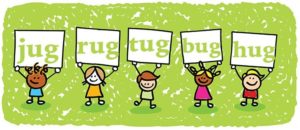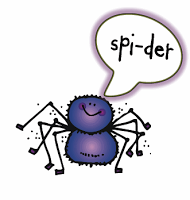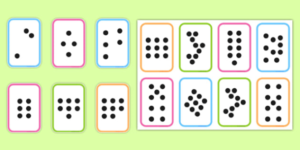Literacy

Before we introduce the phonemes (sounds) we start with skills to develop phonological awareness. Phonological Awareness is a set of skills that children need to recognise and work with the sounds of spoken language and is key in learning to read. It is a child’s awareness of the sound structure, of words. This involves rhyme, syllables, attention and listening, visual and auditory memory (remembering things that they can see and hear).
Your child will learn lots of skills to help them learn how to decode (word out) words:
- alphabet/phoneme knowledge
- rhyme awareness
- syllable detection
- common words
- ‘reading’ the text.
Rhyme

When we introduce rhyme, we emphasis that it’s words that sound the same at the end. We start with detection (can you identify the words that rhyme) before we move on to production (can you give me a word that rhymes with…). Rhyming should be auditory, it should be about hearing the rhyme so we try not to let pupils see how the words are spelt. Rhyme helps with sounding/blending and builds up confidence for writing.
Syllables

Children need to hear syllables in words before they can begin to hear individual sounds. This gives the necessary foundation to be able to sound out words when reading and writing.
To help children identify syllables in words we explore 3 methods:
- clapping out the syllables
- place finger under their chin so that they can feel when they say each syllable
- talk like a robot
Phonics and Spelling
We use the Active Literacy Approach to teaching phonics and spelling in Primary 1.

Reading
The first books your child will bring home are wordless but are very important to your child’s reading development.
Early books allow children to learn how stories work. They allow children to:
- experience holding a book the correct way up.
- gain an understanding of reading direction – reading from left to right.
- practise turning the pages in a book .
- share the reading experience with a family member.
The books that your child will bring home will have already been introduced in the class. By bringing the books home, your child will enjoy talking about the story and discussing what is happening in the pictures.
When they are ready, pupils will then bring home a reading book with words in it. These words will match up with the phonemes the children have been learning in class and can be decoded by sounding them out.
Numeracy

At the start of Primary 1, we spend a lot of time introducing the numbers 0 – 10 in order to develop number formation. We use the rhymes below to help the children learn how to write each number.
The Numeracy and Maths Skills that we focus on, related to number are:
- Recognising numbers
- Number formation
- Counting
- Ordering
- Sorting
- Subitising
- Problem solving
We use a variety of practical materials to help teach Numeracy.
Numicon
![]()
Number Tracks

10 Frames

Dot Images for Subitising


